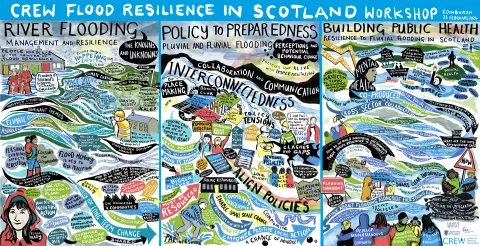
CREW has initiated Science Policy Fellowships aimed at bridging the gap between scientific research and policy implementation. These fellowships enable Scotland's research community to advocate for critical, evidence-based science that addresses water-related policy, regulatory, and industry needs.
The fellowships are part of CREW's broader strategy, which balances a 'research-push' workstream with a 'policy-pull' approach to facilitate expert knowledge exchange. This initiative enhances collaboration between Scottish Higher Education Institutes (HEIs), Research Institutes, policymakers, regulators, and industry representatives.
In the present CREW Programme (2022-2027), three Science Policy Fellowships have been commissioned and completed. These align with and support the development of Scotland’s inaugural Flood Resilience Strategy, focusing on building public health resilience, community engagement, and a comprehensive understanding of flood risks and management. A workshop with over 40 stakeholders from policy, academia, and industry further enriched the Science Policy Fellowships, highlighting practical insights and future directions.
Building Public Health Resilience to Fluvial Flooding in Scotland
As climate change exacerbates the risk of fluvial flooding in Scotland, its adverse effects on public health, especially mental health, are becoming increasingly evident. The first CREW Science Policy Fellowship approached the issue by reviewing literature on the health impacts of fluvial flooding, whilst also identifying factors that influence health resilience.
The fellowship highlighted the need for targeted research to identify vulnerable groups and integrate this knowledge into localized flood emergency management strategies. The recommendations underscore the importance of making public health resilience to flooding a priority in Scotland's emergency management plans.
Policy to Preparedness: Flood Policy and Community Engagement
The second fellowship investigated the interconnectivity of flood-related policies at regional, Scottish, and UK levels. The findings revealed that while these policies promote climate and social justice, their implementation often encounters challenges due to existing societal inequalities. The research emphasized the need for a nuanced understanding of the diverse circumstances and vulnerabilities across Scotland to foster sustainable community flood resilience. This includes acknowledging and addressing the disparities in physical flood risk distribution and the socio-economic challenges faced by low-income communities with limited resources.
Resilience to Fluvial Flooding: Knowns and Unknowns to Recommendations for Management
The third fellowship took a deep dive into the knowledge base for flood risk, resilience, and management. By categorizing knowledge into 'known knowns,' 'known unknowns,' and 'unknown unknowns,' the research team provided a structured critique of current scientific and stakeholder understanding. Utilizing AI to synthesize vast amounts of information, the team identified four key themes: climate change, flood-generating hydrology, natural flood management, and stakeholder engagement.
A Collaborative Path Forward
The CREW Science Policy Fellowships underscore the critical role of collaborative, evidence-based approaches in addressing Scotland's flood resilience challenges. By fostering partnerships between researchers and policymakers, these fellowships aim to translate scientific insights into practical strategies that enhance public health resilience, promote equitable policies, and improve flood management practices across Scotland.
As Scotland moves forward with its first Flood Resilience Strategy, the insights from these fellowships will be instrumental in shaping a resilient, inclusive, and well-prepared society in the face of increasing climate-related challenges.
Access the full project outputs here.